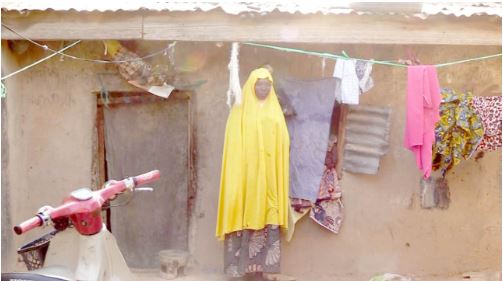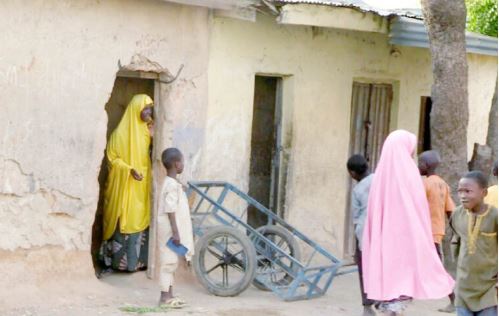
A middle-aged Nigerian woman, Gambo Haruna, whose husband died six years ago after a protracted illness, has been pushing wheelbarrow for the past two years, selling water to fend for her six children, according to Daily Trust.
Living in a rented rickety old thatched mud house, she manages a single room, of which she pays N12,000 per year at Gadar Katako, Rimin Kebe area of Ungogo Local Government Area of Kano.
Life has become extremely difficult for this woman in her early 30s; hence she looks older than her age. And she is embracing every challenge life throws at her by the day.
Speaking on her situation when our correspondent visited her apartment, Gambo said she toiled day and night to fend for her children as she would not want to resort to begging or engage in any illegal activity.
She, however, said her condition was the will of God, and prayed that she would soon see the light of day.
“It is difficulty that forced me to start pushing wheelbarrow to sell water and fend for my family. I don’t know what else to do. I have spent at least two years as a water vendor.
“We used to go to a company to work as labourers to sieve sunflower and get what to eat every day. I also go to places where free food is offered as alms. Even if my children went to school without eating, I would follow them with the food so that they would eat during break time. From there, I will proceed with my water vending,” she said.
Despite the hardship she faces, Gambo does not see any reason her children would not go to school. She makes sure she deals with the situation and sends them to school at all cost because she believes that with education, her children will not be in her shoes, even if she is not alive.
She said, “I don’t want my children to grow up without education; that is why I am doing this. I know that with that alone, I would have achieved my purpose in life and their lives would not be as mine.”

On the business of water vending and the challenges she is facing, Gambo said it required extra energy, adding that she only got between N750 and N1,000 a day, from which she paid N150 to the owner of the wheelbarrow.
“The wheelbarrow is not mine; I hire it to enable me provide for my family.
“I don’t have any other business. When we were working as labourers we got at least N600 after sieving two sacks, depending on the kilo.
“In water vending, I get at least N500 from 10 units of 25litres of cans and N250 as mine. Most of the time, in a day I do two or three trips, meaning that I can get at least N750 in a day. If I am not tired, I can go for another round and get N1,000. From each round, N250 is for the person filling the water for you while you get N250. The person that gives you the barrow on hire gets N150 everyday also.
“We are just managing to survive; we are not after anything else. Every day, I think of leaving this business because even the community doesn’t understand the situation. Someone thinks that you are into it because you like it, while others keep staring. It disturbs me a lot.
“One thing that has brought ease to me is that one of my children’s teachers has waved school fees for them.
“Sometimes, if someone really has pity on you, he sends N500 or N1,000 to you as a gift, but it is not regular. However, at least we eat. Sometimes we spend the day or even the night hungry; that is if I did not get free food for them.
“I always wish that help would come. Nobody wants to keep suffering Whenever I go out I feel rejected. At times I move with tears rolling in my eyes,” she recounted.
She further said, “This room we are living in is rented. We pay N1,000 every month or N12,000 by the end of the year. It is a challenge to pay that amount, but we are surviving.
“My husband was a junior staff with the state government before he died. After the administration of former Governor Ibrahim Shekarau, some members of staff were relieved of their jobs and he found himself among them.
“He went back to his job of sweeping the roadside. He later became a commercial motorcyclist before it was banned by the government. I can recall that even then, life was very unfavourable. He later died as a result of shortage of blood.”





0 Comments